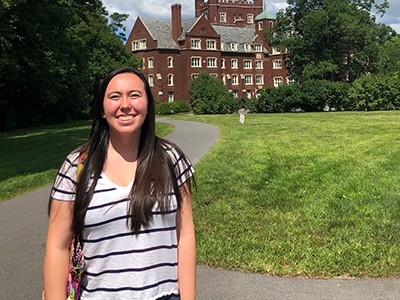News directly from Cornell's colleges and centers
A&S selects 24 sophomores for College Scholar program
By Kathy Hovis
Samantha Sasaki ’23 has been fascinated by the role of music in creating social and political change since high school. Since her interests don’t fit well into one major, she knew even before coming to Cornell that she would apply for the College Scholar Program in the College of Arts and Sciences.
In December, she was named one of 24 scholars in the program, which allows students to design their own interdisciplinary major, organized around a question or issue of interest, and pursue a course of study that cannot be found in an established major.
Students go through a rigorous application process to be accepted into the program in the fall of their sophomore year. Once accepted, students work with faculty to design their unique majors. The program begins with an interdisciplinary research methods seminar and culminates with an independent senior project, usually an honors thesis.
For Sasaki, her discovery of the Singing Revolution piqued her interest in her chosen topic. During the 1980s and 1990, as the Baltic states of Estonia, Latvia, and Lithuania struggled to free themselves from Russian rule, protestors used folk songs and other nonviolent means to push for independence.
“Estonians couldn’t use their native language except during folk festivals,” Sasaki said. “But since a lot of Soviet officials couldn’t understand the messages coming through in the songs, music became the backbone of the movement that allowed them to break away.”
Sasaki said she has discovered many other instances where music and songs have united protestors and social activists in countries around the world.
Sasaki said she plans to take classes in government, psychology, music, media studies, neuroscience, sociology and comparative literature, among other fields.
“I’m really excited to conduct research and dive further,” she said, “not just to have ideas in my head, but come to conclusions, investigate and struggle through all of things that come with research.”
Lauren Thomas ’23 will use her College Scholar project to study developmental and cognitive science as it relates to music and visual media.
“As someone who wants to go into the music industry, I strive to have an in-depth understanding of music and visual media, the way they affect us, the way our culture revolves around them and how we can create meaningful connections through them,” said Thomas, who plans to take courses in developmental sociology, music studies and American studies this semester.
“I look forward to working with incredible professors to hone my abilities and to further answer questions that have been unanswered,” she said.
Erik Kirakosyan ’23 will be exploring how quantum effects can be seen in the field of biology, the idea that some biological processes like photosynthesis or bird migration might also be governed by the non-intuitive behavior of individual atoms and molecules (quantum physics).
“While the idea of quantum effects in biology has been around since (Erwin) Schrödinger, the theory has only gained momentum over the past two decades,” Kirakosyan said. “Perhaps the most exciting part (of my research) is the opportunity to start as an undergraduate. No university has an undergraduate major or departments dedicated to quantum biology. Through the College Scholar program, I truly have the opportunity to enter at the ground level.”
Kirakosyan isn’t certain what his senior project will entail, though he’s most interested in quantum biological effects in humans. He said he’s also enthusiastic about discovering what his peers are studying during the College Scholar Seminar, which all of the new scholars will take this spring.
“It is inspiring to see interdisciplinary connections between topics such as political science, education, art and history,” he said.
Prameela Kottapalli’s ’23 focus will be on access to reproductive services and rights in the U.S. immigration system.
“In examining policies, synthesizing feminist theory and drawing upon one-on-one interviews, my thesis will hopefully outline approaches to advocacy intended to help policymakers and immigration activists more comprehensively support immigrant women and families,” she said. “Along the way, I hope to find more ways to integrate my scholarship with tangible action.”
Kottapalli’s interest in studying the topic arose from various sources, including a summer internship and a class she took last semester in feminist, gender and sexuality studies, Refugees and the Politics of Vulnerability, and a corresponding migrant visitation group.
“The group brought me in direct contact with women in immigrant detention, which introduced me to a lot of the systemic flaws/injustices in the current immigration system,” she said. “These experiences (as well as my own family history) led me to develop a passion for the junction between gender and immigration.”
To learn more about the College Scholar program and read about student projects, visit the College Scholar website.
Media Contact
Get Cornell news delivered right to your inbox.
Subscribe




